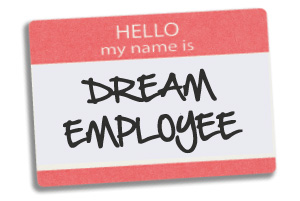 Most of us struggle when it comes to discussing our personal strengths.
Most of us struggle when it comes to discussing our personal strengths.
One of the questions I ask clients the most – whether I’m helping them with career choice, career change or interview preparation – is what are you naturally good at?
And I’m very used to getting a blank look in response.
That’s fine for career explorations, when you’re learning about, and reflecting on yourself… but not for a job interview. For that, you’ll need to talk confidently about yourself, your skills and strengths.
After all, interviews are all about convincing the panel that you’re the answer to their problems – you, selling your personal brand.
How can you pitch to a recruiter, if YOU don’t know what you’re offering?
So, if you’ve got an interview coming up, or expect to in future, you need to get clear on yourself and what you bring…
Here’s 3 ways to start doing just that:
1. How would other people describe you?
As an ex-recruiter, I’ve asked this question many times… and many times, I’ve been greeted with silence. But it’s a simple question.
Are you friendly, serious, adventurous or conservative? Studious and quiet, or the life of the party? And what strengths go with that?
Are you everyone’s confidante – a great listener, with a sympathetic ear? Or a practical, hands-on, roll-your-sleeves-up doer? The knowledgeable, go-to person for technical help, or the social lynchpin, in the know and connected to everyone?
The answers speak to your reputation – and your reputation is critical to your career.
If you don’t know how others see you, find out! Do your own 360 degree survey – ask the people around you (Hint: choose the constructive ones!)
You need to know who you are, and how this sits – and fits – with the job. How it meshes (or clashes?) with the organisational culture. The better you know this, the better prepared you’ll be to shine at interview.
2. What compliments have you been given?
We’re often blind to our own abilities; we can’t see the woods for the trees. And most of us think that if we can do something, so can everyone else. Not so.
In fact, if something comes easily to you, it’s probably a strength.
Other people can see what’s often right in front of our noses – so use that information. Mine your past for positive feedback – from the smallest asides, to formal performance appraisals. What things have people complimented you on? What skills have they noticed, what strengths have they recognized?
Go back through your life, looking for clues, from school and hobbies, to study and work. Even the negatives can be valuable – strengths are often the flip sides of weaknesses. All that talking I did in school? Relationships are my thing…
Can’t think of any compliments? Go back to your cheerleaders and ask; what do they see as your strengths?
3. What are you most proud of?
Even the most self-deprecating and reticent amongst us has something they’re proud of. Something they’ve achieved, somewhere in their life, that they feel good about… and often, that’s a good indicator of values, skills and strengths.
Review your life to date; what are your proudest moments? What things stand out?
Do they centre on people – helping, teaching or taking care of others? Are they about solving problems, pushing yourself out of your comfort zone, or achieving against the odds? What is it, at heart, that you’re most proud of?
And most importantly, what does that example tell me about you?
These stories demonstrate a strength in action – and that’s exactly what recruiters want. It’s the proof of who you are, and what you offer… and in an interview, genuine pride communicates itself clearly. When people own their strengths, their eyes light up, and it really stands out.
These 3 steps start building you a foundation for interview preparation.
Now you’ve got a list of personal attributes, skills and strengths to work with, review them… you’ll likely start seeing themes; patterns which point to who you are, what you’re known for, and what you’re good at.
Talk them through, and start owning those strengths. Build stories around them – real examples of them in use. The stories you tell become part of your identity… and they communicate who you are, at interview.
Crucially, link them to the job you want; What value will they bring to your employer? How will they translate into success in the role? Make the connection.
Once you know your strengths, you know your value… so get out and sell it!



